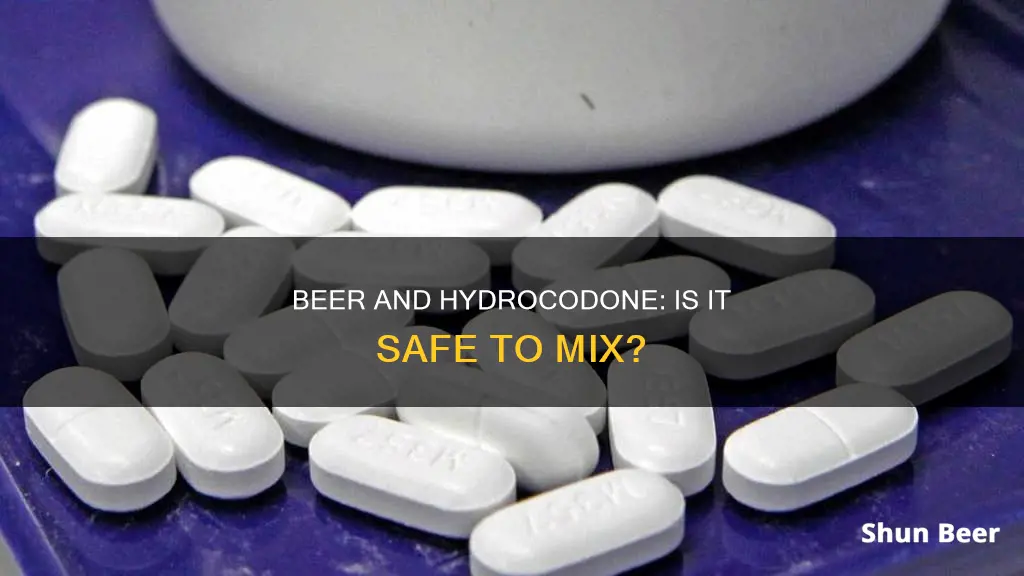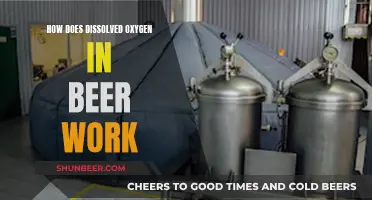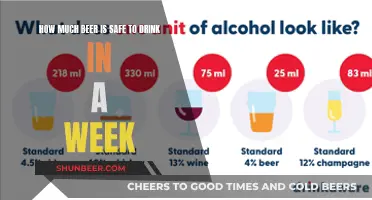
Mixing alcohol with prescription drugs is never a good idea, and it can be extremely dangerous. Both hydrocodone and alcohol are central nervous system depressants, which means they have a sedative effect on the body. When taken together, the side effects of each are intensified and can become life-threatening. Even if you don't mean to take them together, if you drink while hydrocodone is still in your system, you may experience these intensified side effects.
| Characteristics | Values |
|---|---|
| Mixing hydrocodone and alcohol | Dangerous and potentially deadly |
| Why it is dangerous | Both are central nervous system depressants with similar effects |
| Side effects | Dizziness, loss of coordination, extreme blood pressure fluctuations, irregular heart rate, breathing difficulties, loss of consciousness, nausea and/or vomiting |
| Overdose symptoms | Blue or purple fingernails, slow or no heart rate, loss of consciousness, vomiting or gurgling sounds, shallow or slow breathing |
| Treatment for addiction | Residential rehab, outpatient recovery programs, mental health support groups, inpatient rehab, detox, counseling |
What You'll Learn

The dangers of mixing hydrocodone and alcohol
Mixing hydrocodone and alcohol can have extremely dangerous, potentially deadly consequences. Both substances have very similar effects on the body and brain, and when combined, their side effects are intensified. Both hydrocodone and alcohol are central nervous system depressants, which means they have a calming, sedative effect when taken. When taken together, the side effects of both substances are amplified and can cause lasting, irreversible damage to the body.
The primary danger of mixing hydrocodone and alcohol is the impact on the central nervous system. Both substances are central nervous system depressants, which means they slow down the body's functions, including breathing and heart rate. When combined, hydrocodone and alcohol can cause profound sedation, severe respiratory depression, and a heightened risk of overdose. This can lead to permanent damage to the brain, heart, and other organs, and even death.
Side effects of mixing hydrocodone and alcohol
The side effects of mixing hydrocodone and alcohol include:
- Dizziness or a feeling of floating
- Loss of coordination and difficulty with balance or walking
- Extreme fluctuations in blood pressure
- Irregular heart rate, including a rapid heart rate followed by an extremely slow heart rate
- Difficulty breathing
- Loss of consciousness
Overdose risk
The biggest danger of mixing hydrocodone and alcohol is the risk of overdose. The symptoms of an overdose include:
- Loss of consciousness
- Extremely shallow breathing or difficulty breathing
- Unresponsiveness, appearing conscious but unable to answer questions or acknowledge their name
- Skin that appears pale or flushed
- Fingernails, lips, or skin that develops a bluish tint
- An extremely erratic pulse, alternating between slow and rapid heart rates
If you suspect someone is experiencing an overdose from mixing hydrocodone and alcohol, call 911 immediately.
Treatment for hydrocodone and alcohol addiction
If you or someone you know is struggling with an addiction to hydrocodone and alcohol, it is important to seek professional help. Detoxing from these substances can be dangerous and should be done under the supervision of a medical professional. Treatment options include inpatient rehab, outpatient rehab, partial hospitalization programs, intensive outpatient programs, and aftercare support. It is important to address both the physical and psychological aspects of the addiction to ensure a successful recovery.
Beer and Nissen Fundoplication: What You Need to Know
You may want to see also

Side effects of mixing hydrocodone and alcohol
Mixing hydrocodone and alcohol can have serious side effects, and even lead to death. Both substances are central nervous system (CNS) depressants, which means they slow down vital functions like breathing and heart rate. When combined, these drugs can increase the risk of passing out, stopping breathing, or suffering heart failure.
The Centers for Disease Control and Prevention (CDC) found that alcohol abuse is common among those who abuse prescription drugs as their primary substance of addiction. Alcohol was involved in 18.5% of opioid-caused emergency room admissions and 22.1% of opioid overdose deaths. The CDC also found that, in 2015, 91 people died of an opioid overdose every day, including overdoses on fentanyl, heroin, methadone, and prescription painkillers.
The risk of a fatal overdose is much higher when drugs are combined to get high. If a person struggles with alcohol abuse, opioid addiction, or both, they need medically supervised detox and evidence-based rehabilitation to overcome these dangerous conditions.
Mixing hydrocodone and alcohol can also lead to polydrug abuse, which is extremely risky and puts a person at great risk of death from overdose. With so many people struggling with opioid and alcohol abuse, it is likely that these two conditions will overlap.
In addition, the effects of mixing alcohol and hydrocodone can be unpredictable and stronger than either drug alone. It can also lead to an increased risk of:
- Impaired motor control
- Risky sexual behavior
- Anoxic brain injury and other organ damage
- Alcohol and other substance use disorders
Texas Beer Laws: Drinking While Driving
You may want to see also

Why people mix hydrocodone and alcohol
Mixing hydrocodone and alcohol is extremely dangerous and can even be deadly. Both substances are central nervous system depressants, which means they have a calming, sedative effect when taken. This can lead to respiratory depression and a heightened risk of overdose and death. In fact, in 2017, 14.7% of opioid deaths involved alcohol.
So, why do people mix hydrocodone and alcohol? Here are some possible reasons:
- To intensify the sedative effects of alcohol and hydrocodone.
- To deepen the sense of relief that comes with hydrocodone, especially if they are dealing with severe pain.
- To help them sleep, which may be difficult if they are in pain.
- To enhance the "high" feeling that hydrocodone can produce.
- To compensate for weakened effects of one substance.
- To prevent withdrawal symptoms from alcohol or hydrocodone.
- To self-medicate as a way to deal with previous trauma, life circumstances, or health issues.
- To replace their preferred drug of choice when it is unavailable.
It is important to note that mixing hydrocodone and alcohol is a form of substance abuse and can quickly lead to addiction. The side effects of mixing these substances include dizziness, loss of coordination, extreme fluctuations in blood pressure, irregular heart rate, and difficulty breathing. If you or someone you know is mixing hydrocodone and alcohol, seek professional help immediately.
Old Beer, Still Good? Drinking Two-Decade-Old Brews
You may want to see also

Treatment for hydrocodone and alcohol addiction
Mixing alcohol and hydrocodone is extremely dangerous and can be deadly. Both substances are depressants, and when combined, they increase the risk of passing out, suffering heart failure, or dying. The risk of a fatal overdose is much higher when drugs are combined with alcohol.
If you or someone you know is struggling with alcohol and/or hydrocodone addiction, it is important to seek professional help. Treatment for polysubstance use is possible and often involves a combination of detox, psychological treatment, pharmacological treatment, and monitoring. Here are some steps to take for treatment:
Detoxification:
The first step is to undergo detoxification, where the body rids itself of alcohol and opioids. This process can be challenging, as it may involve withdrawal symptoms such as restlessness, sweating, nausea, and vomiting. It is important to do this under medical supervision to ensure safety and manage symptoms and cravings.
Inpatient or Outpatient Rehab:
After detox, individuals can choose between inpatient and outpatient rehab. Inpatient rehab involves living in a facility with 24/7 care, participating in individual counselling, group therapy, pharmacotherapy, and psychoeducation. Outpatient rehab allows individuals to live at home while receiving treatment, but at a lower intensity.
Partial Hospitalization or Intensive Outpatient Programs:
Partial hospitalization programs (PHP) are highly structured outpatient offerings that provide treatment several days a week for several hours a day. Intensive outpatient programs (IOP) are more intensive than traditional outpatient treatment, requiring patients to attend a set number of hours per week for a specified duration.
Aftercare and Sober Living:
To prevent relapse and continue supporting the individual's transition to a substance-free life, aftercare options such as 12-step programs and ongoing counselling are available. Sober living homes provide substance-free environments for individuals to continue their recovery journey.
Telehealth:
Telehealth is a convenient and flexible treatment option offered via phone or online. It includes individual or group counselling, various therapies, and peer meetings.
Support Groups:
Support groups such as Alcoholics Anonymous offer free meetings and support for individuals seeking to overcome their drinking problem. These groups provide a sense of community and shared experience, which can be invaluable during the recovery process.
It is important to remember that treatment plans may vary depending on individual needs, the presence of co-occurring mental health issues, and the availability of treatment options. Seeking professional help is crucial to ensure a safe and effective recovery process.
Drinking Beer on Florida Beaches: What's the Legal Verdict?
You may want to see also

How to get help for a hydrocodone addiction
Mixing alcohol and opioid drugs like hydrocodone is not recommended by medical professionals. Both substances cause similar effects in the brain and can compound each other's intoxication, increasing the risk of overdose and death.
If you or someone you know is struggling with addiction, there are several ways to get help:
- Reach out to a trusted person: It can be a friend, family member, religious or spiritual leader, or a healthcare professional. It is important to choose someone you trust and can speak openly with. They can provide emotional support, help you find a healthcare professional or support group, or just listen.
- Contact a helpline: There are several helplines available, such as the SAMHSA National Helpline (1-800-662-HELP (4357)) and the Crisis Text Line (text MHA to 741741). These services provide free, confidential support and referrals to treatment facilities, support groups, and community-based organizations.
- Seek immediate help in a crisis: If you or someone you know is in a life-threatening situation or crisis, call 911 or go to the nearest emergency room. You can also contact the 988 Suicide & Crisis Lifeline by calling or texting 988 or chatting online.
- Find a healthcare provider: Consider reaching out to your primary care provider for an initial mental health screening and referral to a mental health professional. You can also look for mental health professionals through federal resources, such as the Substance Abuse and Mental Health Services Administration (SAMHSA), state and county agencies, insurance companies, or employee assistance programs.
- Treatment options: Treatment for polysubstance use typically involves withdrawal management, psychological treatment, pharmacological treatment, and monitoring. It may include inpatient rehab, outpatient rehab, partial hospitalization programs, intensive outpatient programs, aftercare, sober living, and telehealth.
Drinking Beer in Public: Hong Kong's Laws and Culture
You may want to see also
Frequently asked questions
No, you should not drink beer or any other alcoholic beverage while taking hydrocodone. Mixing alcohol with hydrocodone is extremely dangerous and can be deadly.
Both substances are central nervous system depressants, which means they have a calming, sedative effect when taken. When taken together, the side effects of each are intensified and can cause lasting, irreversible damage to the body.
Common side effects include dizziness, loss of coordination, extreme fluctuations in blood pressure, irregular heart rate, and difficulty breathing. Mixing these substances can also lead to risky behaviours, such as unprotected sex and driving under the influence.
If you or someone you know has mixed hydrocodone with alcohol, it is important to seek medical help immediately. Call 911 or another emergency number in your area if you notice any signs of an overdose, such as loss of consciousness, shallow breathing, or blue lips or fingernails.







